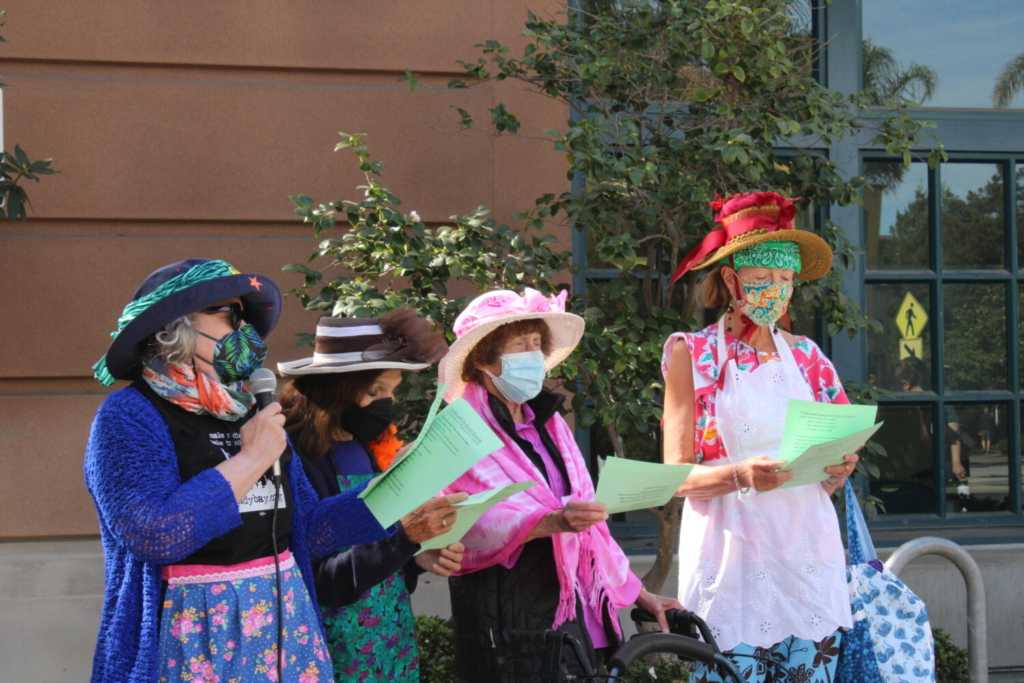Raging Grannies: Getting to know local elderly activists
*Editors’ note: This article initially stated a transcription error that has since been changed to clarify that Robertson’s parents were “federal” employees. All story corrections can be found under the ‘Corrected Stories’ tab.
“Fight, fight, fight with us, fight for what is right, join the Grannies in our quest for reproductive rights!”
The upbeat battle cry sung to the tune of “Row Row Row Your Boat” came from a group of older women dressed in floral aprons and extravagant sun hats during a Roe v. Wade reversal protest in front of the Redwood City Public Library on Oct. 22. The Raging Grannies, recognizable for their exaggerated grandmotherly clothing, are often seen on the streets “promoting peace, justice, social and economic equality through song and humor,” according to its website. The Raging Grannies Action League, its Bay Area chapter, was formed in 2001. We talked to three local Grannies about their personal road maps of activism.
Ruth Robertson
Ruth Robertson joined the Raging Grannies Action League shortly after it was formed and has been a member for more than 20 years. She currently serves as co-convener of the group, leading protests and organizing meetings. Robertson said she appreciates the attention that the recognizable Raging Grannies image gets them.
“We like the image because it gives us a chance to speak when people don’t often listen to us as older women,” Robertson said.
Robertson’s activism was influenced by her parents, who were involved in the politics of the McCarthy era. At the time, many were afraid to speak on any left-leaning ideas due to being labeled as communists.
“My parents were federal government employees worried about losing their job, so they hunkered down and got real quiet real fast,” Robertson said.
“We can see that we’re helping the next generation make sure that those social equality ideas carry through through protests.”
— Ruth Robertson, Raging Granny
Robertson said despite her parents originally discouraging her from protesting, she still spent much of her time as a high school student marching against the Vietnam War. Robertson’s experience in social activism is a common thread among Grannies. Many have campaigned over decades for a variety of issues including reproductive rights.
“This [abortion access] was something we fought for in our generation and won,” Robertson said. “So to see them so quickly and easily dismantled is disheartening to say the least.”
Robertson hopes to pass on the wisdom she has learned from lifelong experiences to younger generations of activists.
“We can see that we’re helping the next generation make sure that those social equality ideas carry through through protests,” Robertson said. “We very much believe that feet on the streets is what’s needed.”
Consuelo Beck-Sague
Consuelo Beck-Sague joined the Raging Grannies Action League after witnessing them protesting on the streets.
“We [Beck-Sague and her husband, who attends events in support] saw you and we wanted in,” Beck-Sague said when addressing Robertson.
Prior to involvement with the Raging Grannies, much of Beck-Sague’s work was dedicated to running a clinic with her husband in the Dominican Republic.
The clinic treated people of all ages, but one of the main focuses was lowering the mother-to-child transmission rates of HIV.
“My mom was in a foreign country and was able to develop a record [of government policies], that’s amazing.”
— Santiago Beck, Beck-Sague’s son
“We help with the scale-up of antiretroviral therapy for children,” Beck-Sague said.
She also helped the government make policies that would eliminate mother-to-child HIV transmissions.
“There’s this idea that if the mom has HIV then the baby is automatically going to catch the virus, but that’s not the case,” said Santiago Beck, Beck-Sague’s son. “You can actually implement policies that sort of eliminate that transmission.”
Beck-Sague and her husband travel back to the Dominican Republic regularly.
“My mom was in a foreign country and was able to develop a record [of government policies],” Beck said. “That’s amazing.”
Ines Hill
Ines Hill immigrated to the U.S. from Argentina when she was 22 for college and later on became a substance abuse rehabilitation counselor for the county of Santa Clara. Hill said she had never thought of herself as an activist until recently.
“I was busy working, was married, all those things,” Hill said.
Hill joined the Peninsula Peace & Justice Center with her husband and she met the Raging Grannies for the first time through the organization. After her husband died, she stopped attending the PPJC because she felt there was no need for her there anymore, so she became a Raging Granny.
“We represent what I believe in.”
— Ines Hill, Raging Granny
She has loved it ever since, feeling included and passionate about the current issues and local problems they hold demonstrations over.
“We represent what I believe in,” Hill said.
Even though issues like abortion no longer affect Hill herself, she feels the need to support the young women whom they do affect majorly.
Through the Raging Grannies, Hill hopes to be heard. She speaks with Telemundo, an American Spanish-language terrestrial television network when they are at their protests, or other Spanish newspapers when the opportunity arises.
“And plus, I like the ladies,” Hill said. “It’s fun.”





